- Home
- A. C. Crispin
Alien Resurrection Page 5
Alien Resurrection Read online
Page 5
And all she could do was wait. She was good at waiting. Better at it, she suspected, than these humans.
One of the humans was talking to the others. That’s all the humans seemed to do, stand and view her and talk with one another. She didn’t understand them, but then, she didn’t need to. She knew the colony had faced them before. There had been victories, there had been defeats. There would be victory again. She could wait. She was good at waiting, even if right now, she was bored to death.
The name on one of the observers’ garment read “Peréz.” The names on the other two read “Gediman,” and “Wren.” The sign over the mechanism that opened the door they had entered through read, YOU MUST SUMMON THE GUARD ON DUTY BEFORE THE DOOR WILL BE OPENED. It said the same thing in six other languages and she could read those languages. She didn’t question how she could do those things, any more than she questioned how she could breathe, or think, or eliminate. She just did them.
The humans continued talking with one another.
She wondered if their bones were as brittle as those of the man who’d freed her from her host. She wondered if their blood was as warm as that of her host, tasted as sweet, ran as freely when they were torn apart. Those thoughts entertained her through her boredom.
Soon, it would be time for her to reproduce. This tiny, Alien environment would be too small to contain her magnificent ovipositor, too small to contain the wealth of her brood. Too small, too cold, too hostile.
She longed for the steaming warmth of the crèche. The strength and safety of her own kind. She was burdened with the aloneness of her special individuality. And the driving need to reproduce—
Soon there would be warriors enough to protect her, and to construct the perfect crèche. And these humans, these pitiful, soft humans, would be food for her young, and host to the new brood. It would happen.
But there were memories. Of unexpected chaos. Warriors screaming and dying. And fire. And one human, standing firm, holding her own young in her arms. Causing death and destruction to the crèche.
She blinked, confused, her mind a sudden shambles of fragments, memories, instincts she could not sort out.
The sweeping pain of loss—sickening, irretrievable loss—flooded her mind, her entire body. It meant nothing—it meant everything.
She searched for the connection to her own kind, she searched to find the strength and safety of the crèche, but it was not there. And in its place was nothing but this pain, this terrible loss. She was hollow. Empty.
But she would not always be. Her body knew. There would be another crèche. There was always another crèche. She would build it herself. She and her children. In spite of their guns, in spite of their restraints, the humans would fall to them. They would feed her, and she would give birth to her young. She would take this place by force. As she always had. As she always would.
Our structural perfection is matched only by our hostility. Even the humans admire our purity. We are survivors unclouded by conscience, remorse, or delusions of morality.
The perfect organism…
4
Gediman sat across from Ripley at the mess table, but several seats away. He wanted to give her space, even if it was only the illusion of privacy. It was quiet in the combination mess hall/recreation complex, and they were the only two eating. There were two guards posted at the door, but they were such a part of the scenery aboard the Auriga that Gediman barely noticed them. He doubted Ripley did anymore, either.
She was still in restraints, but in the last few days they’d been loosened to permit her more mobility. Ever since they’d shown her the picture of the little girl, she’d been strangely passive and introspective. She’d offered no resistance to anything, and had shown no more tendency to violence. Wren thought the picture of the child had triggered enough of her human memories to allow her to assume some of her old personality. She’d been a ship’s officer, Wren said. She knew how to obey, to follow orders. Gediman wondered.
The relaxed restraints allowed her to feed herself for the first time. Gediman was pleased about that. Force-feeding her had been unpleasant, and he didn’t believe they’d been getting enough nutrition into her. However, now that she had the chance to feed herself, she didn’t seem terribly interested. She’d eaten some, but mostly she’d just moved the stuff around on her plate. It was typical ship’s fare—processed, dehydrated, and reprocessed enough to barely resemble any recognizable food—but she showed little appetite. Gediman was worried about depression. Wren had shrugged off his concerns.
Gediman was almost done with his breakfast when he noticed her examining her fork, showing much more interest in it than she ever had the food. He wiped his mouth.
“Fork,” he said to her helpfully. He wanted so badly to communicate with her, establish a basis of understanding. If he could do that, he could find out what was going on in her mind, the one aspect of her they couldn’t really study. What did she remember? What did she know? Gediman was consumed with finding out.
Ripley eyed him sideways through slitted lids. She always avoided direct eye contact. She parroted the word softly, but incorrectly. “Fuck.”
He was embarrassed for her and was glad no one else was present to hear. He corrected her gently. “Fork.”
Her expression changed. He almost thought she’d smiled, but then it was gone. She startled him with a question. “How did you…?”
It seemed such an effort for her to speak, he anticipated the rest. “How did we get you? Hard work. Blood samples. Tissue samples, taken on Fiorina 161, on ice in the infirmary there.”
Such a simple explanation for such a complicated job. It was unprecedented work. The samples were varied enough, and there were plenty of cells, but the DNA was in chaos. It had been an amazing discovery to find that the embryonic Alien that had already infected Ripley’s body when the blood and tissues were taken had not stopped its invasion there. Like a virus, the embryo had actually invaded the host’s living cells—every last one of them—and forced them to change to accommodate its growth and development. It was a major breakthrough in adaptive evolution. It was a way to guarantee that any host, any host at all, would provide whatever it was the developing embryo needed, even when the host’s own body was inadequate.
The infusion of Alien DNA into Ripley’s own had been how they’d managed to incubate her and her embryo. But it hadn’t been easy. They’d had to separate out the DNA right down to the RNA, reconstruct it, try to get it functioning… It had been work, incredibly hard and frustrating work, and it had taken years.
But now she sat here, like any other human being, eating food like any other human being.
And her terrible child, even now—
“Fiorina 161…” Ripley said quietly, as if tasting the word, fitting it into her mouth. “Fury…?”
“Does that ring a bell?” Gediman asked, pushing. If she would only talk to him. “What are you remembering?”
She didn’t answer the question, just gave him that same sideways glance. “Does ‘it’… grow?”
Gediman blinked, surprised. “If ‘it’…” She’s asking about the embryo we took from her? Yes, she must be! “Yeah, ‘it’ grows. Very fast.”
“It’s a Queen,” she said decisively, putting down the fork. She pushed the plate away.
She was under anesthesia. How…? “How did you know?”
“It’ll breed,” she said, tonelessly. For the first time, she looked him straight in the eye. “You’ll all die. Everyone in the…” she glanced at the fork, “…fucking… company will die.” She continued to stare at the fork.
“Company?” What was she talking about?
“Weyland-Yutani,” Wren explained. He’d entered the mess hall and come around behind Ripley, but Gediman had been so absorbed in his conversation with her, he’d never noticed.
Wren still wore that patronizing little smile on his face, the same expression he always wore when he was dealing with Ripley. It was odd that he should, Gedima
n thought, considering that the marks she’d left on his throat were still visible.
The chief scientist boldly sat next to the woman. He had no interest in giving her personal space. Instead, he seemed intent on invading it, as if pushing her, as if he wanted to see whether she’d strike out at him again. Gediman didn’t like it, but there was nothing he could do. It wasn’t as if Wren ever listened to him.
As Ripley glanced at him from the corners of her eyes, Wren brazenly picked food off her discarded plate, the way a parent might eat from his child’s meal.
“Weyland-Yutani,” Wren explained to Gediman, “were Ripley’s former employers. They were a Terran Growth conglom; had some defense contracts under the military. Long before your time, Gediman. They went under decades ago, bought out by Wal-Mart. Fortunes of war.” He turned his attention back to the woman, gave her a cool smile. “You’ll find things have changed a good deal since your time.”
There was that fleeting change of expression on her face again, Gediman noted. Almost a smile. “I doubt that,” she said.
Wren didn’t pretend to misunderstand her comment. “We’re not flying blind here, you know. This is the United Systems military, not some greedy corporation.”
Like he wouldn’t work for a ‘greedy corporation’ if they’d let him do this kind of science, Gediman thought, but kept it to himself.
Ripley only stared at her plate. Her words were lifeless. “It won’t make any difference.” The sentence seemed to trigger some memory in her, making her frown and consider. Then she continued, “You’re still gonna die.”
Wren clasped his hands in front of him, in full “doctor” mode. “And how do you feel about that?”
She shrugged. “It’s your funeral, not mine.”
Wren didn’t like that answer. His impatience started to show. For once, he dropped the pedantic child-speak he usually inflicted on her. “I wish you could understand what we’re trying to do here. The potential benefits of this race go way beyond urban pacification. New alloys, new vaccines…! There’s nothing like this on any world we’ve seen.” He stopped, as if realizing he was revealing too much about himself.
Gediman could see the frustration in Wren’s expression. But Gediman knew Ripley couldn’t possibly understand or appreciate their plans. They were, after all, the kind of dreams only scientists could value. But Wren was right—the potential was boundless. It might take decades to determine the genetic complexities of the creatures and how the unique genetic code that could grow acid blood and silicon carapaces could be adapted to different lifeforms. Learning how the parasitic symbiont genetically and chemically modified its host would advance biochemistry and biomechanics into the next century. The work they’d done to simply produce Ripley and her Alien offspring had set cloning techniques ahead a hundred years!
Wren’s patronizing tone returned. “You should be very proud.”
She actually laughed. It was a bitter, ugly sound. “Oh, I am.”
Now Wren tried to reassure her. “And the animal itself is wondrous. They’ll be invaluable once we’ve tamed them.”
Ripley turned that laserlike stare on Wren, who drew back before it. “It’s a cancer. You can’t teach it tricks.” Wren had nothing to say to that, much to Gediman’s surprise.
Ripley toyed with the fork again, drawing inward, thinking. Gediman ached to know what. But all she said was the simple word, “Them.”
* * *
Distephano watched the small private ship on an approach vector to the Auriga. Up till now, this had just been another boring shift, killing time in the command capsule. He noted the approach of the small ship in the log, then sent an official notification to the general. He’d never seen a private vessel out here before. Not this close to the Auriga. Granted, this was nowhere near as exciting as the incident last week with that test-tube female in the lab. But how often was something like that going to happen?
Officially, he’d been told nothing about the incident after making his report, but unofficially he’d heard the charge he’d given the female had certainly straightened her attitude out. She’d been meek as a lamb ever since. In fact, he’d heard they’d taken her completely out of restraints yesterday. They were even giving her a little “walking around” space. Sounded okay to him, since there were always two guards on her. And after they heard about his action, the others knew to pay attention. It was the most exciting gig around here, guarding the test-tube lady. What a weird assignment!
Almost instantly, he received a reply to his report.
“Approaching vessel has General Perez’s approval to dock,” Father said, the masculine computer voice eerie in the confines of the small bubble. “Authorization code six-niner-niner-three. Security on full alert.”
Interesting, Distephano thought. Private vessels rarely, if ever, brought cargo or supplies to the Auriga. This was a top-secret, ultra hush-hush vessel. Your clearances had to have clearance just to deliver food. Yet, this little horsefly was just gonna get to pull on up, huh?
Vinnie heard the automated announcement coming in from the approaching vessel that gave its registration number and name. The Betty, huh? He took the numbers the little ship’s feminine computer voice had given him and punched them into his console.
“Registration code of approaching vessel,” Father intoned, “is nonexistent. There has been an error. Please input number again.”
The hell there’s been an error, Vinnie thought, annoyed. He punched in the code again, much more carefully.
“There is no such registration number listed with United Military Systems,” Father told him. “If there has been no input error, then the incoming vessel is unregistered.”
Not possible, Vinnie thought. He notified the general again, at once, then contacted the incoming vessel, demanding its authorization code before permitting final approach. Even if it were… They wouldn’t have the balls to pull into a military station!
Vinnie expected the Betty’s authorization to be immediately canceled. That would be pretty interesting in itself. Either the ship would veer off in a righteous hurry, or, if it really needed to dock because of damage or injury to the staff, then it would request aid on a mayday code. If Perez rejected that…
If he rejected it, I might have to actually shoot the ship down! Distephano considered that. He had enough firepower under his thumb to scatter the small vessel into atoms. He watched the ship growing larger.
What he got was not what he expected. General Perez’s voice—the Old Man himself!—barked into his ear through his headset.
“I gave that ship authorization to dock, Soldier,” Perez said irritably. “What’s the problem?”
The surprise of hearing Perez’s own voice, instead of an automated response—which Vinnie usually assumed came from some other officer—thoroughly rattled him. Distephano groped for words.
“Uh, I’m sorry, sir, it’s just… the registration numbers, uh…!” He gulped and pulled himself together. “Sir! No problem, sir! Docking will commence, sir!”
“You see that it does!” Perez snapped.
Vinnie gazed at the incoming ship. It’s a pirate, a fucking real, one-hundred percent, outlaw pirate vessel. No registration numbers. No official anything. And it’s coming in on Perez’s own invitation. How about that!
With a smug smile, Vinnie remembered his C.O.’s warning when he’d taken this assignment. Once you’re out there, boy, you just remember—don’t ask. Don’t tell. Anything. They better not come back to me and say I didn’t train you right. Yeah, this gig was bound to lead to bigger and better things—providing he didn’t piss off the Old Man again.
You can bet that won’t happen twice. It’s C.Y.A. all the way for this boy.
The small ship held steady on her approach. He could see her clearly now. She even looked like a pirate, painted in drab camouflage colors that would mask her appearance if she had to fly low over a plant-covered landscape. A versatile little vessel, she was obviously designed for space, but had an
gled side compartments that could easily reconform to aerodynamic wings for atmospheric flight. She also had tail fins to make her more agile in the air. But she was an old vessel, patched in many places with mismatched parts, dirty and banged up. She was a stark contrast to the hulking, dark Auriga that dwarfed her.
Vinnie blinked, peering at some graphic painted on the fuselage. What the hell…?
He started to laugh. He was a World War II buff, so he recognized instantly the stylized, antique rendering of what had once been called a “cheesecake pinup.” Right under the ship’s name, a round-hipped, buxom woman in scanty, form-fitting clothes, suggestively rode an antique rocket across the fuselage of the small ship.
Yeah. The Betty, sure enough. Things are sure getting more and more interesting around here, after all.
* * *
Aboard the Betty, things were always interesting. At least, interesting enough for her captain, Frank Elgyn, a reedy-thin, angular man in his midforties, whose dark eyes and prominent nose added to his predatory appearance. He shifted in the copilot’s seat, and propped a booted foot against the console. He’d just been asked for an authorization code from some green-horned, wet-behind-the-ears grunt! He turned to the chair next to him and laughed lightly. His pilot, Sabra Hillard, a tall, strong-bodied woman, grinned back at him and shook her cropped head.
Like there might be an authorization code anywhere in existence for this ship, making this run, with this cargo. Sure.

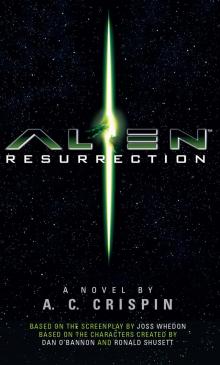 Alien Resurrection
Alien Resurrection Star Wars - The Han Solo Trilogy - Rebel Dawn
Star Wars - The Han Solo Trilogy - Rebel Dawn Storms of Destiny
Storms of Destiny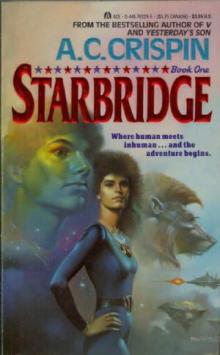 Starbridge
Starbridge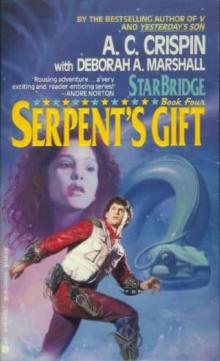 Serpent's Gift
Serpent's Gift Pirates of the Caribbean: The Price of Freedom
Pirates of the Caribbean: The Price of Freedom V01 - V
V01 - V Silent Dances
Silent Dances V
V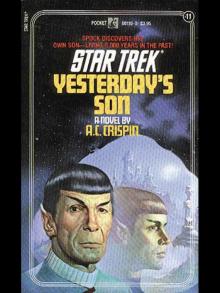 Yesterday's Son
Yesterday's Son Shadow World
Shadow World STAR TREK: TOS #11 - The Yesterday Saga I - Yesterday's Son
STAR TREK: TOS #11 - The Yesterday Saga I - Yesterday's Son Star Wars - Han Solo Trilogy - The Paradise Snare
Star Wars - Han Solo Trilogy - The Paradise Snare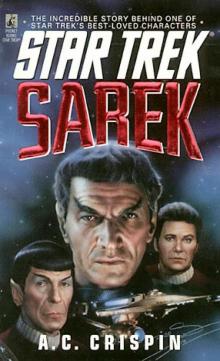 Star Trek - Sarek
Star Trek - Sarek Star Wars: The Han Solo Trilogy I: The Paradise Snare
Star Wars: The Han Solo Trilogy I: The Paradise Snare